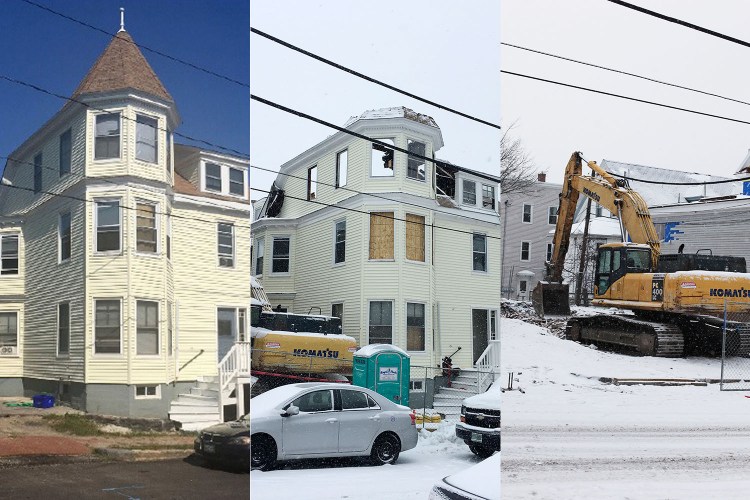The Portland City Council approved a moratorium early Tuesday morning that prohibits building demolitions for six months and freezes site plan applications for 65 days on Munjoy Hill.
City councilors heard more than two hours of comments from the public Monday night, then deliberated for more than an hour, finally voting 7-2 to pass the moratorium after midnight.
City Councilor Belinda Ray, who represents the district and proposed the moratorium, offered an amendment Monday to allow site plan applications already in process to keep moving forward despite the moratorium. The final language also allows for a building to be demolished if it is deemed dangerous.
The action will otherwise stall housing construction in one of the city’s most competitive neighborhoods.
“I feel the need is clear for this moratorium not only because of the pace with which the demolitions have sped up, but also because I think we need to have a break in order to have a good community conversation,” Ray said.
 The moratorium is a response to residents who are concerned about how the rapid pace of development is changing the East End. They say affordable housing and historic buildings are being torn down for high-end condominium buildings that they view as out of scale with surrounding buildings.
The moratorium is a response to residents who are concerned about how the rapid pace of development is changing the East End. They say affordable housing and historic buildings are being torn down for high-end condominium buildings that they view as out of scale with surrounding buildings.
“It’s just to push the pause button,” said Martica Douglas, who lives on Munjoy Street. “It doesn’t forever prevent people from building or tearing down or whatever.”
Hilary Bassett, executive director of Greater Portland Landmarks, said the organization supports the moratorium. Munjoy Hill is home to many buildings that survived the Great Fire of 1866, which ravaged other parts of the city.
“We believe it strikes a balance between new development and preserving the character of Munjoy Hill,” Bassett said.
But opponents expressed concern about the fate of applications in process and the financial consequences for those property owners.
Munjoy Hill resident Harry McMann said he would have been in financial straits if his recent rehab of a single-family home had fallen under the moratorium.
“I urge you to think twice before you wreak havoc with people’s lives that have invested their savings in these homes,” McMann said.
Quincy Hentzel, CEO of the Portland Chamber of Commerce, warned the council against adopting a moratorium.
“We risk the potential of casting a chilling effect over development in all sectors,” she said.

This rendering shows the four-story, five-unit condominium building, right of center, proposed for 24 St. Lawrence St. on Munjoy Hill in Portland.
The recent push came in response to two condo proposals, one on Monument Street and the other on St. Lawrence Street. The two-family home at 24 St. Lawrence St., which was built in 1851, would be torn down and replaced with a four-story, five-unit condo.
Walter Williams, who owns and lives in that house, was one of several speakers Monday night who encouraged the city to exempt applications already in process, including his.
“To bring the current building up to code is simply cost-prohibitive,” he said.
Residents of the area said they have seen an increase in demolitions since the city changed zoning on the peninsula two years ago to make it easier to build on small lots.
City officials, who are reviewing the impact of the zoning changes, said their analysis shows that 14 buildings have been torn down, or are planned to be torn down, since 2015, most of them in East Bayside and on Munjoy Hill.
Officials could not say how many of those demolitions involved replacing apartments with condos. But a review of planning files at City Hall shows that in most cases, apartment buildings – or single-family homes – are being razed and replaced with multi-unit condo buildings.
The moratorium will stop the issuance of demolition permits in the R-6 zone on Munjoy Hill for projects that would tear down more than half of a building’s exterior, or a building’s front facade. That ban will last for 180 days, retroactive to Dec. 4.
The moratorium will also block site plan applications for projects in the same area from being filed within a 65-day period, to give the city staff time to come up with different, interim design standards for new buildings. The staff will then work with the community to develop final design standards, which could be enacted before the end of the six-month moratorium.
During the moratorium, city officials may consider adopting some sort of conservation district for Munjoy Hill, an idea that has been proposed in the past by Greater Portland Landmarks, a nonprofit preservation group, but failed to generate support.
The preservation group conducted an inventory of historic and architecturally significant homes on Munjoy Hill that was last updated in 2003. Buildings near Fore Street at the end of St. Lawrence, Waterville and Atlantic streets were built around the 1846 founding of the Portland Co. to house workers at the railroad foundry.
City planners also are considering a set of recommendations for strengthening the city’s condo conversion ordinance, said Jeff Levine, the director of planning and urban development. That ordinance requires extended notice periods and payments to low-income residents, and assesses a per-unit fee on conversions, but it applies only to existing apartments that an owner wants to sell as a condominium. It has not been applied to projects that demolish apartment buildings to make way for new condos.
Megan Doyle can be contacted at 791-6327 or at:
mdoyle@pressherald.com
Twitter: megan_e_doyle
Send questions/comments to the editors.


